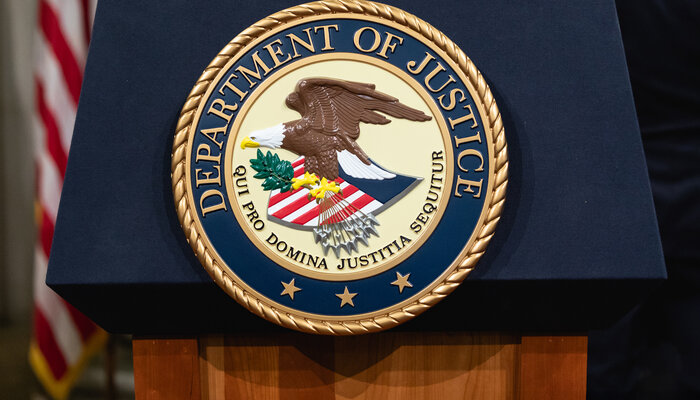Looking at this week’s headlines from the Justice Department, it’s hard to tell whether it’s 2025 or 1973. On Thursday, Manhattan’s interim U.S. attorney resigned rather than follow an order to drop the corruption charges against New York City Mayor Eric Adams. After the department transferred the case to its Washington-based Public Integrity Section, several of the lawyers in that unit also resigned in rapid succession. The stunning development recalls President Richard Nixon’s infamous “Saturday Night Massacre,” during which several Justice Department officials resigned rather than carry out Nixon’s order to fire the special prosecutor investigating the Watergate scandal.
The Adams case order and subsequent resignations serve as the first test of two memos issued on Attorney General Pam Bondi’s first day in office. Those memos insert Trump’s personal and partisan vendettas into the department’s decision making, shattering longstanding principles intended to shield the Justice Department from White House influence. Together, they aim to transform the department into the president’s own personal law enforcement agency.
One memo, paradoxically titled “Restoring the Integrity and Credibility of the Department of Justice,” both accuses the prior administration of engaging in “weaponized” prosecutions and creates a “Weaponization Working Group” to investigate a long list of Trump’s perceived enemies, including Special Counsel Jack Smith and his staff, the Manhattan district attorney and New York State attorney general, and those who investigated or prosecuted January 6 rioters.
The other memo targets the department’s career attorneys, demanding that they “zealously advance, protect, and defend” the president’s agenda and threatening to discipline or terminate any attorney who “refuses to advance good-faith arguments on behalf of the Administration, or otherwise delays or impedes the department’s mission.”
Bondi’s memos build on a flurry of executive actions aimed at the Justice Department during the president’s first weeks in office. For example, the “Weaponization Working Group” implements an executive order directing the attorney general and the director of national intelligence to investigate whether federal law enforcement authorities “weaponized” the government during the Biden administration. In the president’s first week, the administration fired several career lawyers involved in prosecuting Trump for attempting to overturn the 2020 election. And in an unprecedented move, the department immediately removed and reassigned nearly 20 other career attorneys from the national security and criminal divisions. The agency relies on these subject matter experts not only to investigate and prosecute complex crimes, but also to maintain institutional memory and partnerships across administrations.
By design, the administration’s “shock and awe” campaign makes it difficult to evaluate the impact of these actions in real time. But one thing is already clear: these actions eviscerate the post-Watergate consensus that has governed interactions between the department and White House for nearly half a century.
On September 6, 1978, Attorney General Griffin Bell gathered Justice Department lawyers to address Watergate’s fallout and chart a new path forward. The scandal had exposed high ranking officials across the federal government (including former Attorney General John Mitchell) for their involvement in the 1972 break-in at the Democratic National Committee headquarters and the subsequent cover-up. The aftermath had “given rise to an understandable public concern that some decisions at Justice may be the products of favor, or pressure, or politics,” Bell said. His remarks outlined three bedrock principles that would protect the department from similar concerns in the future.
First, Bell explained that the department needed procedures and principles to ensure that improper considerations, including personal or partisan interests, don’t influence legal judgments. After Nixon’s attempt to hinder the Justice Department’s investigation into Watergate, Bell introduced policies increasing transparency in decision making and limiting contact between the vast majority of the department’s staff and members of the executive and legislative branches.
By their very nature, Bell reasoned, the positions of power held by members of Congress and White House staff created an undue risk that any communication, no matter how innocent, could unfairly influence litigation decisions. The president and attorney general would always need to communicate on broader questions of policy priorities, but that communication must still allow the department to act without undue influence in criminal and civil cases.
Second, Bell emphasized that democracy depends on public confidence in the department’s objectivity. The Justice Department functions as the “acknowledged guardian and keeper of the law.” That’s why, Bell explained, the public must view it as a “neutral zone, in which neither favor nor pressure nor politics is permitted to influence the administration of the law.”
Bell’s final principle was self-explanatory, yet indispensable: the success of the first two principles hinged on the department’s lawyers, who must always be committed to good judgment and integrity.
The lessons of Watergate have anchored the relationship between the White House and Justice Department for some 50 years. To be sure, Bell’s principles have not always held. Multiple presidents have tested or breached their boundaries, including Trump in his first term. But the scope, speed, and brazenness by which the new administration has already interfered with the department’s “neutral zone” is unprecedented.
In his order to drop the case against Mayor Adams, the acting deputy attorney general offered an openly political justification for the decision: the prosecution would prevent the mayor from giving his “full attention and resources” to the president’s immigration agenda. And although the department had not assessed “the strength of the evidence or the legal theories on which the case is based,” it claimed that the prior administration’s “weaponized” prosecutions had unfairly targeted Adams.
Bondi’s “Weaponization Working Group” explicitly follows the president’s order to investigate those he views as political enemies, going as far as to target some by name. It’s consistent with Trump’s campaign promises to do exactly that. Public reports estimate that since 2022, Trump has issued more than 100 threats to investigate, prosecute, imprison, or otherwise punish his perceived opponents. Lest there be any confusion that the president seeks to influence law enforcement decisions, the executive order on “weaponization” requires a report — delivered directly to the White House — with recommendations for “remedial actions.” Bondi’s memo appears to welcome his influence, promising to deliver “quarterly reports” to the White House on the working group’s progress.
It’s difficult to imagine a more blatant attempt to undermine Bell’s first principle of insulating the department’s legal judgments from improper personal or partisan considerations. Nor is it possible to overestimate the effects of these threats on Bell’s second principle regarding public confidence in the neutrality of the Justice Department. If the attorney general acts on the president’s grudges, how can the public have faith in the critical premise of any healthy democracy: that the law not be used to favor or punish anyone based on politics?
The new administration’s attack on career civil servants takes aim at the third principle of ensuring that the department’s lawyers are committed to good judgment and integrity. The department’s new leadership conceded that it valued political loyalty over both of these principles when it fired lawyers assigned to work on criminal prosecutions of the president, explaining that “the Acting Attorney General does not trust these officials to assist in faithfully implementing the President’s agenda.”
The department’s swift removal and transfer of nearly 20 subject matter experts further drives home that perceived loyalty is the top priority. Indeed, among those reassigned was the department’s most senior career official responsible for navigating ethical disputes and recusing attorneys on matters that might pose conflicts of interest.
Bondi’s “zealous advocacy” memo goes one step further, promising to punish attorneys who “deprive[ ] the President of the benefit of his lawyers” by declining to appear in court or sign briefs. This directive not only conflicts with civil service laws and legal ethics rules protecting government lawyers who refuse to sign off on improper or unethical arguments, but also misconstrues who department attorneys represent — the United States, not the president. Already, this week’s resignations have revealed the memo’s underlying ultimatum: comply with the president, or quit.
The long-term effects of these actions remain to be seen. More attorneys may refuse to bow to the president’s wishes. The department’s actions may face legal challenges. Public opinion may eventually prompt departmental reforms, including those proposed by the Brennan Center’s nonpartisan task force on the rule of law and democracy.
But today, the department faces a crisis even greater than what it confronted in the 1970s. If the administration continues to force out attorneys committed to good judgment and integrity, who will be left to uphold the public’s confidence in its neutral zone? In Bell’s own words, “We cannot quantify the benefits, but all of us know, intuitively, that the confidence of our citizens in our Government and its justice system is beyond value.”






